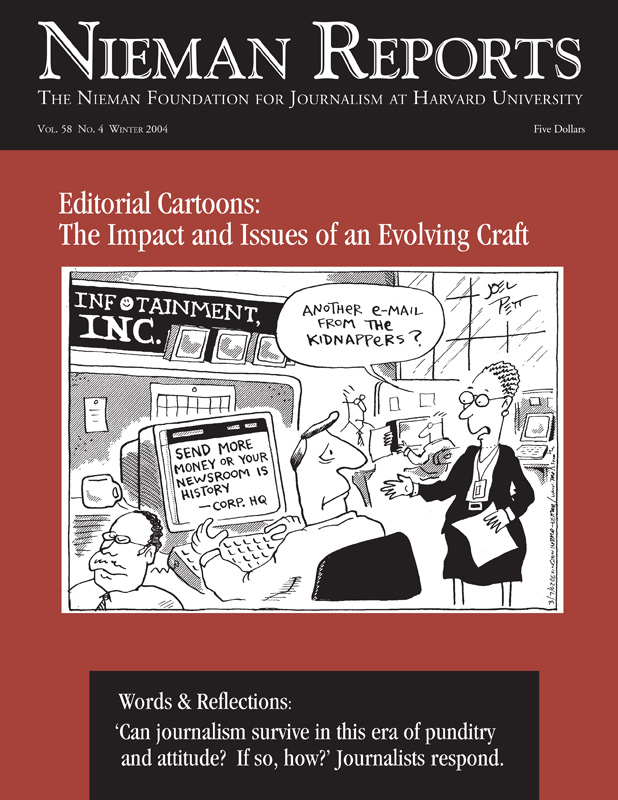People often ask me what it is like backstage at “The McLaughlin Group” or Chris Matthew’s “Hardball” or Fox’s “The O’Reilly Factor.” “Do you and your fellow panelists go out for a beer?,” they ask. “Do you pal around together?” I sense what they really want to know is whether the disagreements they see are nothing more than a show. We don’t really mean it, they suspect. It’s just infotainment.
Well, on every show on which I happen to argue, I mean it. I mean what I say on the air as sincerely as I mean what I write in my newspaper column. I did not go to journalism school to become the sort of dweeb who likes to argue. I came by it quite naturally. This characteristic, obnoxious in a roommate, can be pure gold on the talk show circuit. Helped along by my rapier wit, keen-eyed knowledge and rat-like cunning, it has gained for me a perch, however modest it might be, in today’s pantheon of punditry, a perch that is becoming increasingly crowded, not nearly as special as it used to be.
Once, I am told, there was actually a time when you could swing a dead cat in Washington without hitting a pundit, which is a Hindi word for “learned man.” Two or three imperial figures in Washington like Walter Lippmann, Joseph Kraft, or Stewart Alsop defined and dominated this profession, offering perspectives with lyrical language, seamless logic, and insiders’ eyes.
Modern media, particularly the Internet, have democratized the game. The writing might not be nearly as good, but there’s way more of it. I do not fear for the survival of journalism in this era of punditry and attitude. I think there will be a hunger for accurate and reliable reporting as long as there is something newsworthy happening. There is also a need for the analytical and investigative role that holds the powerful accountable and keeps the rascals on notice. But what troubles me is that the prognosis is less bright for the sort of punditry that tries to explain the complexities of the world in a way that makes sense without leading a rah-rah squad for one partisan side or another. Goodbye to all that. Hello to infotainment.
I sensed trouble when my local column of social and political thought was picked up for national syndication in the late 1980’s. The first question the marketing executives asked me was, “By the way, Clarence, what are you?”
Excuse me? Patiently they explained that op-ed page editors want to know, first and foremost, whether I am a liberal or a conservative.
Ah, having never confined my broad mind to such narrow parameters, I confessed that I was “not sure.” That would not do. We talked. We settled on an appropriate pitch line that went something like, “A liberal who sometimes will surprise you.” I still like that.
While some of us pundits still pride ourselves on being unpredictable, the marketplace increasingly seeks the predictable. Just as FM radio has fragmented since the “Top 40” days into music formats targeted to the narrowest of tastes (“hard rock,” “soft rock,” “classic rock,” “Christian rock,” “urban contemporary,” “hip-hop …”) so has political talk, except it has fragmented into two Manichaean choices: liberal and conservative. Listen and believe? No, believe and then choose to what you want to listen.
Quite often the result, as Jon Stewart of “The Daily Show” famously bellyached on CNN’s “Crossfire,” is pseudo-intellectual cheerleading, a battle of heat-seeking interests masquerading as serious discourse. One tunes into such programs to have one’s beliefs, notions
and prejudices reinforced. If thorough consideration of an opposing view is the beginning of intellectual growth, much of today’s infotainment sounds brain dead.
Ah, well. Infotainment is not all bad, or I would not participate in it. Ideally I still cling to the hope that its heat-seeking arguments will tantalize wider audiences, particularly the ever-elusive youth audience, and lure them more deeply into traditional serious journalism, like that offered by the newspapers that run my column. A revival of literacy sparked by television? Ah, I can dream, can I not?
My nightmare, by contrast, is a nation growing apart into two nations, red-state America and blue-state America, polarized by the wedge of a political culture that honors the art of compromise and consensus less than the brute sport of digging in one’s heels.
The daily newspaper has its limits but, bless its ink-stained heart, it still tries mightily to offer all things to all people. When you pick one up and open it, brace yourself, dear reader, for an opinion that just might not agree with yours. What a concept. I wonder if it has a future.
Clarence Page is a columnist for the Chicago Tribune.


